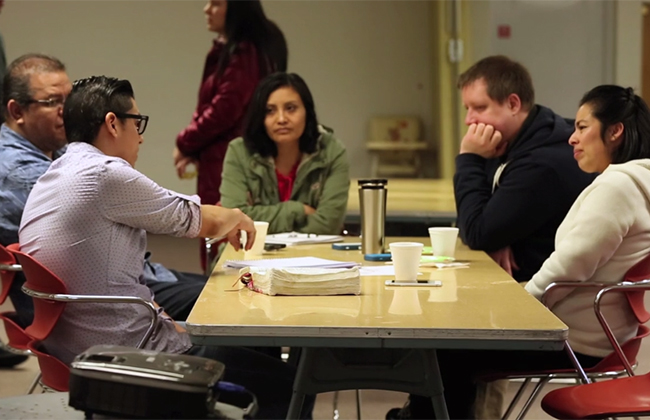When Rodrigo Cano started Alas Conexion in Grand Rapids, Michigan, he, his wife, and his daughter were trying to lead the church all by themselves.
“We realized this was not a healthy way to be doing ministry,” Cano says.
Being part of an RCA learning community (groups of congregations that come together to learn from and with one another) helped Cano connect with and empower others to be leaders in the church. One of those people was Jason, whom Cano first met at a Grand Rapids mega mall.
“Among all these Hispanics and Latinos, I see this man. His name is Jason, and he’s white,” recalls Cano. “I say, ‘What are you doing here?’ He starts talking to me in Spanish, and he’s married to a Latina.”
Cano told Jason about the church he was starting, and Jason admitted that he had some resentment toward the church. Cano invited him to Bible study anyway. Jason decided to come.
At the Bible study, Jason “opened his heart,” Cano says. ”He started a process of healing, of development.
Now Jason is following God’s call to become a leader in the church himself.
Watch the video about Jason’s leadership journey:
This was just one of the stories of God at work through Transformed & Transforming highlighted at the Transformed & Transforming celebration at General Synod on Friday night. The celebration launched the Transformed & Transforming dashboard, an interactive online tool that shows how RCA churches are engaging with Transformed & Transforming.
Learning communities like the one Cano participated in are one of four different types of engagement with Transformed & Transforming that the dashboard measures. Leadership collaboratives, connection events, and leadership communities are the others.
Leadership collaboratives bring together small groups of church leaders for a three-year leadership development process. Connection events are single-day equipping events that introduce ways for churches to increase impact in a ministry area.
Leadership communities and learning communities both bring leaders from RCA churches together to learn from and with each other, but leadership communities are designed for churches that are already leaders in the ministry area, while learning communities may include churches that are interested in exploring a new ministry opportunity.
During the celebration, general secretary Tom De Vries also led a Q&A session with three different participants in leadership collaboratives.
“The value I’ve learned in the process is you can’t do transformation without community,” Chad De Jager, one of the participants, reflected. “If you find yourself in a leader role in an organization and there’s nobody to walk with in your organization, you’ve got to partner up with some other people. If a leadership collaborative is the way to do that, you do yourself and your congregation a favor and jump in with a community that can help you find the transformation you need.”
The celebration also featured videos about how a connection event helped a woman with hearing loss participate in Sunday school at Reformed Church of Syracuse, New York, and how a leadership community helped Trinity Reformed Church in Orange City, Iowa, build a culture of disciples making disciples.
See full synod coverage at www.rca.org/synod.





